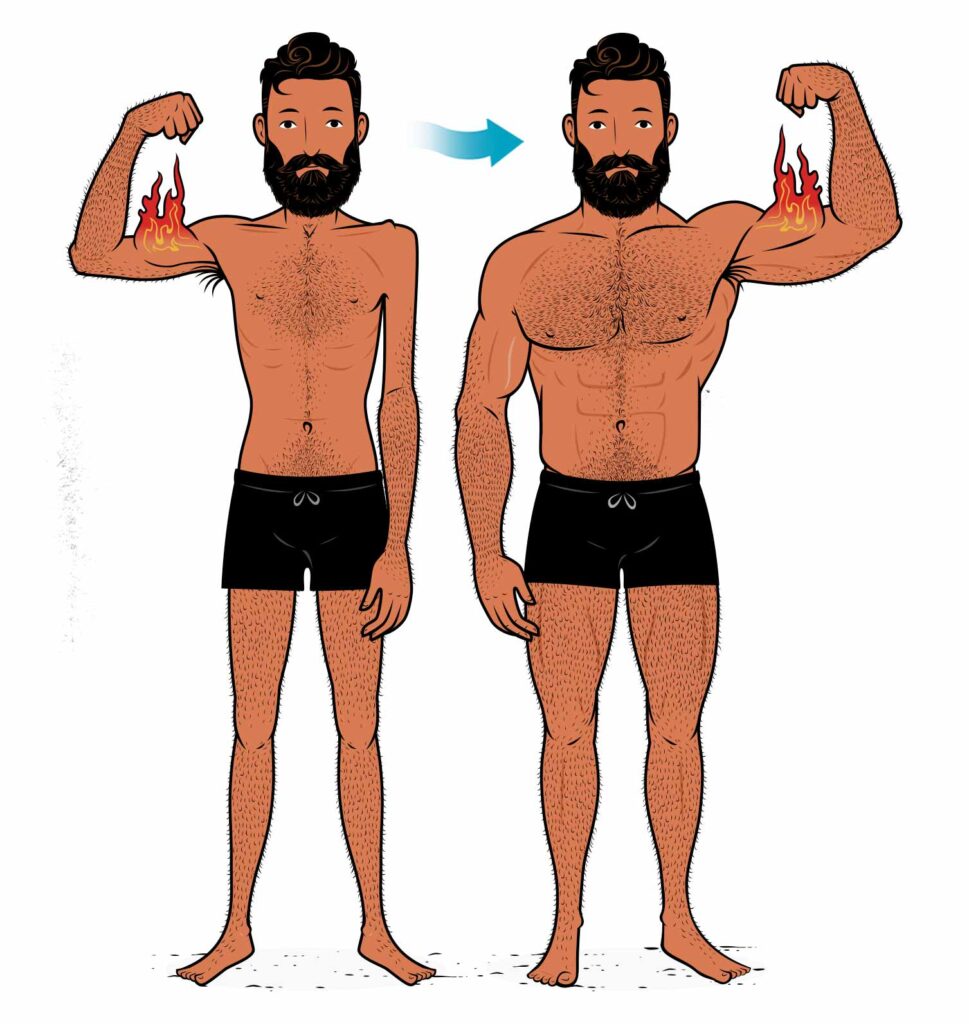Are you one of those lucky individuals blessed with a fast metabolism who struggle to put on weight? If so, we have just the thing for you! Our product, “Tips for Gaining Weight with a Fast Metabolism,” is designed to help you navigate the challenges of gaining weight when your metabolism is constantly working against you. In this article, we will provide you with practical tips and strategies to help you achieve your weight gain goals and feel more confident in your own skin. Say goodbye to feeling frustrated and welcome a healthier, more well-rounded you!
Tips for Gaining Weight with a Fast Metabolism
Having a fast metabolism can make gaining weight a challenge, but it’s not impossible. By following these tips and making some adjustments to your diet and lifestyle, you can increase your calorie intake, choose nutrient-dense foods, and incorporate weight training to help you achieve your weight gain goals.
Increase Calorie Intake
One of the most important things to do when trying to gain weight with a fast metabolism is to increase your calorie intake. You need to consume more calories than your body burns in order to put on weight. To determine your daily calorie needs, consider factors such as your age, gender, activity level, and metabolism. Consulting with a registered dietitian or nutritionist can help you determine the right calorie intake for your goals.
Once you know your daily calorie needs, focus on eating larger portion sizes. Add an extra serving or two of food to your meals to increase your calorie intake. Additionally, try snacking between meals to further boost your calorie consumption. Choose high-calorie snacks such as nuts, nut butter, granola bars, or protein shakes to increase your calorie intake throughout the day.
Choose Nutrient-Dense Foods
When trying to gain weight, it’s important to choose nutrient-dense foods that provide your body with the necessary vitamins, minerals, and macronutrients. Opt for whole grains such as brown rice, quinoa, and whole wheat bread as they are higher in fiber and nutrients compared to refined grains.
Include lean proteins in your diet such as skinless chicken breast, turkey, fish, and tofu. These proteins are essential for muscle growth and repair. Incorporate healthy fats and oils such as avocados, olive oil, and coconut oil into your meals and snacks. These fats not only provide additional calories, but they also play a crucial role in hormone production and brain function.
Don’t forget to add dairy products to your diet if you tolerate them well. Milk, yogurt, and cheese are excellent sources of protein, calories, and calcium which are essential for healthy bones and muscles.

Eat Frequent, Balanced Meals
Another key aspect of gaining weight with a fast metabolism is to eat frequent, balanced meals. Plan and prepare your meals in advance to ensure you have access to calorie-dense foods throughout the day. Include a variety of food groups such as protein, carbohydrates, and fats in each meal to create a well-rounded and balanced plate.
To balance macronutrients in each meal, aim to include a good source of protein, a complex carbohydrate, and a healthy fat. For example, have a chicken breast, a side of brown rice, and a drizzle of olive oil on your vegetables. This combination provides you with a balance of nutrients and calories to support weight gain.
Include Healthy Fats in Your Diet
Healthy fats are an essential component of a weight gain diet, as they are calorie-dense and provide numerous health benefits. Choose foods that are rich in monounsaturated and polyunsaturated fats, such as avocados, nuts, seeds, and fatty fish like salmon or tuna.
While it’s important to include healthy fats in your diet, it’s also essential to use cooking oils and dressings in moderation. These add flavor and calories to your meals, but excessive consumption can lead to unnecessary weight gain. Opt for cooking methods that require less added fat, such as baking, grilling, or steaming.
Incorporate nuts and seeds into your snacks and meals as they are packed with healthy fats and proteins. Sprinkle some almonds or chia seeds on your yogurt or have a handful of mixed nuts as a snack. These small changes can make a big difference in your daily calorie intake.
Focus on Protein-Rich Foods
Protein is an essential nutrient when it comes to gaining weight, as it helps build and repair muscles. To ensure you’re getting enough protein, include lean meats, poultry, and fish in your diet. These sources of protein are not only calorie-dense, but they also provide a complete amino acid profile that your body needs to build and maintain muscle mass.
If you follow a plant-based diet, there are plenty of protein-rich options for you too. Incorporate foods such as tofu, tempeh, lentils, chickpeas, and quinoa into your meals. These plant-based protein sources are not only high in protein, but they also provide other important nutrients and fiber.
If needed, you can also consider consuming protein shakes or supplements to boost your protein intake. These are convenient options, especially if you struggle to meet your protein needs through food alone.
Consume More Complex Carbohydrates
Complex carbohydrates are an excellent source of energy and play a vital role in gaining weight. Choose whole grains such as whole wheat bread, oats, and brown rice, as they provide more fiber and nutrients compared to processed grains like white bread or white rice.
Include starchy vegetables such as sweet potatoes, corn, and peas in your meals as they are high in carbohydrates and provide additional vitamins and minerals. Incorporate legumes and pulses such as lentils, black beans, and chickpeas into your diet as they are not only rich in carbohydrates, but also provide a good amount of protein and fiber.
By focusing on complex carbohydrates, you can fuel your body with the energy it needs to support weight gain and improved muscle growth.

Incorporate Weight Training Into Your Routine
In addition to adjusting your diet, incorporating weight training into your routine is crucial when trying to gain weight with a fast metabolism. Weight training helps build muscle mass, which contributes to weight gain and improves overall strength.
Focus on compound exercises that target multiple muscle groups, such as squats, deadlifts, bench presses, and rows. These exercises engage large muscle groups and stimulate muscle growth throughout your body. Lift heavy weights with proper form to challenge your muscles and promote strength and hypertrophy.
Include resistance training in your schedule at least two to three times per week. This will give your muscles enough time to recover and grow stronger. Gradually increase the intensity and volume of your workouts to continue challenging your muscles and promoting growth.
Stay Hydrated
Staying hydrated is essential for overall health, including when trying to gain weight with a fast metabolism. Drink adequate amounts of water throughout the day to keep your body hydrated and support digestion and nutrient absorption.
In addition to water, include hydrating foods and beverages in your diet. Enjoy fruits and vegetables with high water content, such as watermelon, cucumber, berries, and leafy greens. Incorporate hydrating beverages such as herbal teas, infused water, and smoothies into your daily routine.
Limit excessive diuretic intake, such as caffeine and alcohol. While these drinks can be enjoyed in moderation, excessive consumption can lead to dehydration and interfere with your weight gain goals.

Get Enough Rest and Sleep
Rest and sleep are often overlooked when it comes to weight gain, but they are crucial for muscle recovery and growth. Aim to get enough rest and quality sleep each night to allow your body to repair and rebuild muscle tissue.
During sleep, your body releases growth hormones that are essential for muscle growth and repair. Additionally, lack of sleep can lead to increased appetite and cravings for unhealthy, high-calorie foods. Make sleep a priority and ensure you’re getting 7-9 hours of uninterrupted sleep every night.
Monitor Your Progress and Adjust Accordingly
Lastly, it’s important to monitor your progress and make adjustments to your diet and exercise routine accordingly. Keep a food diary to track your calorie intake and ensure you’re meeting your goals. This will also allow you to identify any gaps in your nutrition and make necessary adjustments.
Regularly track your body measurements, such as weight, body fat percentage, and muscle mass. This will help you assess your progress and make changes if needed. Consult with a registered dietitian or nutritionist to get professional guidance and support on your weight gain journey.
Remember, gaining weight with a fast metabolism requires patience and consistency. With the right approach, proper nutrition, and focused exercises, you can achieve your weight gain goals and build a healthy, balanced physique.
